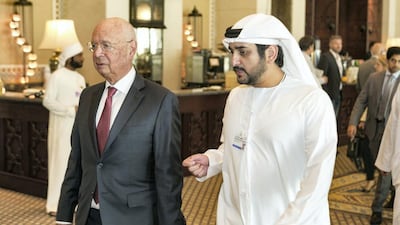Only agile governance can help countries develop an effective way to harness the opportunities and tackle the challenges facing the world from the rapidly developing technologies changing the way we will work and live over the next decade, a gathering of the World Economic Forum in Dubai heard on Saturday
The UAE was the venue for the world’s “biggest brainstorming on the future” as hundreds of experts met to build a vision of what 2030 will look like in terms of how technologies such as artificial intelligence, robotics and blockchain will impact us.
“I myself have been struck by the speed of developments of some of those technologies [for example] artificial intelligence or blockchain. We will need to develop principles and protocols to make sure those technologies have a positive impact and become broadly accepted by society,” said Professor Klaus Schwab, founder and executive chairman of the World Economic Forum.
He said that institutions had to show much greater agility and also the capacity to appreciate the interdependence between issues.
He also highlighted the UAE’s leadership in this regard, for example the appointment of the world’s first minister for artificial intelligence, Omar Al Olama.
_______________
Read more:
Artificial intelligence major focus of Abu Dhabi security conference
How innovation makes public services immune to disruption
_______________
Prof Schwab was speaking at the World Economic Forum’s Annual Meeting of the Global Future Councils in Dubai where a gathering of hundreds of experts is working on some of today’s biggest challenges and opportunities related to what the Wef calls the Fourth Industrial Revolution.
In the past two years, the 35 councils have been building a vision for 2030, with areas of focus including the challenges and opportunities facing the workplace, health, mobility, infrastructure investment, decarbonisation and food sustainability.
"The future is a global and moral shared responsibility," said Mohammad Al Gergawi, Minister of Cabinet Affairs and the Future of the United Arab Emirates, who is also co-chair of the two-day meeting. He spoke of the gathering's mission to "seek to transform concepts of the Fourth Industrial Revolution into an international shared agenda."
“The UAE has become an open global laboratory for the Fourth Industrial Revolution,” he said.
Mr Al Gergawi highlighted how the digitisation of data, the Internet of Things and the globalisation of knowledge are impacting skills and economic growth around the world.
An Internet of Things Strategy and Data Wealth initiative was launched last month by Sheikh Mohammed bin Rashid, Vice President and Ruler of Dubai.
Present at the opening session of the meeting were Sheikh Maktoum bin Mohammed, Deputy Ruler of Dubai, Dr Sultan Al Jaber, minister of state, Noura Al Kaabi, minister of culture and knowledge development, food security minister Maryam Al Muhairi, and the minister for climate change and the environment Thani Al Zeyoudi.
Prof Schwab also announced that the theme of the forum’s annual meeting in Davos in January will be “creating a shared future in the fractured world”.
“In a world that is increasingly becoming multi-stakeholder, multi-conceptual we need mobilisation to create a shared positive narrative, a shared forward looking narrative for human kind,” he said.


